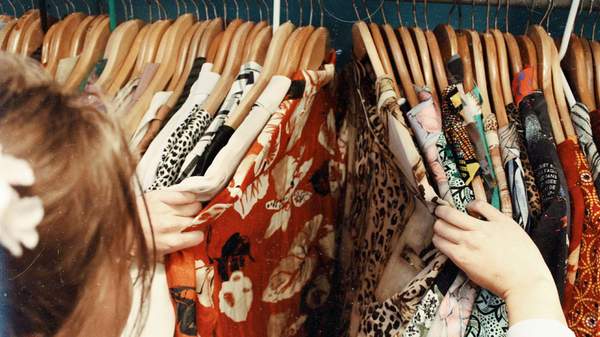Overview
From the classic, selfless do-gooder acts of cleaning up the coastline or donating crucial goods, to those which make us feel good when we do it (puppy fostering, anyone?), there are many small ways for everyone to help their fellow humans or animals or environment this spring.
Foster a puppy, become a personal stylist, pick up marine debris, help welcome a refugee into New Zealand, do all or some of the above or even just some other small act of kindness and make the world just that little bit better this season.
FOSTER A PUPPY
Without the dedicated, hard work of the pooches on the frontline of biosecurity, New Zealand would probably by now have had a lot more biosecurity threats and outbreaks like the famed fruit fly outbreak of 2015 (which ended up costing our country $13.6 million to get rid of). Which is why your country needs you, to foster a puppy.
Yes, you've read correctly. The Ministry of Primary Industries is currently looking for foster families for puppies set to become the detector doggos of the future and they will even cover the expenses involved for looking after said pup.
Detector dog puppies live with families for the first 14 months of their lives before they start their 13-week detector dog training. While living with the families, MPI covers pretty much all of the costs involved with raising a pupper — food, veterinary costs, shampoo and flea treatment, collars, toys, leads etc. In return, you just have to socialise the puppy (read: pat to death) and give it some basic training.
The only catch is you have to be working from home, have to have a large section with a 1.2 metre high wall and have children over the age of four to qualify.
Alternatively, if you don't meet the above criteria, the SPCA is always looking for cat and dog foster parents to look after their animals for a period of three to six weeks. See their website for more details.
PICK UP MARINE DEBRIS
Known for their beach clean up efforts and tree planting, Sustainable Coastlines are running a clean-up session on Saturday, 24 November at Pukerua Bay on the Kāpiti Coast. Porirua City Council and community groups operate restoration projects all around this area, so Sustainable Coastlines wants to help them give some love and pick up some of the marine debris that washes up on this coast. You can either just clean up around Brendan's Beach, or, if you feel like a bit of an adventure, walk further afield and go right around the point to Plimmerton. Show up any time from around 9.45am at the car park at Pukerua Bay (look out for the Sustainable Coastlines and Kathmandu flags). The clean-up session will run from 10am and finish around 2pm. You can stay for as little or as long as you like, but around noon there will be some food and drinks available.
Bring sturdy, closed-toe shoes, sunscreen, a waterproof jacket and a water bottle. To register, follow this link.
BE A PERSONAL STYLIST TO WOMEN STRUGGLING TO GET INTO THE WORKFORCE
Shopping is often disregarded as a generally flimsy pursuit, but for women who haven't had employment for a while, the right outfit can have a huge impact in their lives — possibly leading to them gaining employment and subsequently financial independence.
Dress for Success is always on the lookout for volunteers keen to work as dressers for these women in order to give them a one-one-one consultation "providing a complete interview outfit, make-up, jewellery, styling and valuable confidence-boosting and job ready support."
Besides helping the women find a snazzy outfit, Dress for Success is a "wrap-around service so she feels confident and prepared for her job interview", which means they also provide career coaching services. For those who might not have time, donating worn, but not worn-out, work clothes is another way to help.
HELP MAKE A REFUGEE FEEL AT HOME IN NEW ZEALAND
As a Red Cross refugee resettlement volunteer your job is to help settle refugee families or individuals into their new home in New Zealand. What that looks like in practice can include everything from setting up their home before they arrive, helping them enrol into schools and with doctors' medical practices, showing them how to use public transport and introducing them to other typical Kiwi quirks like Eftpos cards and how jandals are socially acceptable footwear almost 100 percent of the time. It also includes just being there for them and helping support them in setting up their new life as you would support a friend.
The first two to four weeks of a resettlement volunteer's placement is generally the busiest, filled with the lion's share of initial appointments and settling in tasks. After about the six weeks mark less time is generally required as the family settles in, by which stage volunteers typically visit the families or individuals on a weekly basis. For those who can't make the time commitment, the Red Cross also highly welcome donations of first or secondhand furniture and household electronics to help set up the refugee families' homes.
DONATE YOUR OLD PHONE TO HELP WOMEN STAY SAFE
Shine is a charity focused on providing "a range of effective, practical and innovative services to achieve our mission to stop domestic abuse in New Zealand". The charity works directly to help thousands of adult and child victims every year to become safe and stay safe through their services which include professional training programs, the DVFREE workplace program, and their health sector partnerships.
The organisation always needs donation of cellphones and chargers (which are in good working condition) to help get women out of dangerous situations. Non-perishable food donations and nappies are also always welcome.
